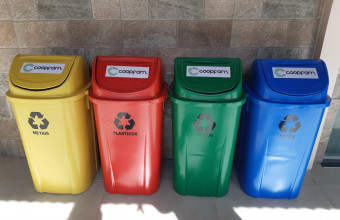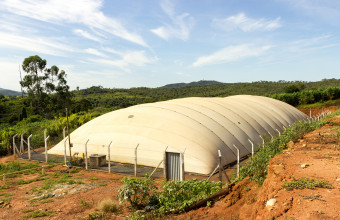Until 1999, Brazil imported peanuts because it did not have a product of international quality. Fortunately, this story has changed. Today, not only do we export the food (albeit in small quantities), but Coplana – a São Paulo state cooperative based in Jaboticabal – is one of the main peanut suppliers to the European Union, one of the strictest markets on the planet.
Nationally and internationally renowned for the cultivation of sugarcane and the production of the renewable fuel ethanol, Coplana started to encourage small producers to plant peanuts on their properties in the late 1990s. Initially, it was a strategy to help recuperate the soil, since the sugarcane planting works in rotation with peanuts. But the results were beyond expectations and the cooperative started to bet on this new crop as well.
Today, Coplana’s peanuts have permanent monitoring to ensure their quality, with automated sampling of the entire volume that arrives at the grain unit, and the use of barcodes for product traceability.
In addition, the grain selection is electronic, and specific sensors reinforce the health criteria. For all this, the cooperative has received international certifications that ensure product excellence and sustainability, such as theBRCGS (Brand Reputation Compliance Global Standard) and Nestlé Responsible Sourcing.
The cooperative’s successful premium peanut project has transformed the economy in the interior of the state of São Paulo, generating jobs and income in the region. The production follows sustainability criteria, with the adoption of good agricultural practices and compliance with environmental and labor legislation.
REVERSE LOGISTICS
The concern with the environment is also present in other projects of the São Paulo cooperative, among them, Coplana’s Center for Receipt of Defensive Packaging – the first reverse logistics initiative of defensive packaging in Brazil.
The unit started operating in 1994, long before the correct disposal of these packages was required by law in 2002. The decision to take care of this material in a responsible manner arose from the cooperative members’ commitment to the environment and to the quality of life of the people who live in the countryside. And it is worth noting: the initiative served as a reference for the implementation of the reverse logistics system in other countries and for the Brazilian legislation, which determines the correct return and disposal of these materials (Law 9.974/00).
From the beginning of the Central’s activities until December 2019, Coplana collected 15,171 tons of packaging. Annually, the volume collected is 500 tons, among plastic, metal, cardboard and lid packaging.
At the end of last year, a new package receiving center was inaugurated in Guariba together with the Campo Limpo Museum, which has the objective of keeping the memory about the important work done since the beginning of the system in Brazil. At the site, students and other visitors will have access to the main events that led to the concretization of the system. Panels, infographics and artifacts produced by the recyclers will be used to describe the path taken by post-consumption packaging.
In March 2021, as part of a national initiative in all the units that receive pesticide packaging, the management of Coplana’s plant will be taken over by the National Institute for Empty Packaging Processing (Inpev).





